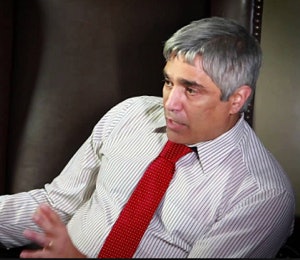History professor Anthony Esolen recently came under fire when he penned an article for Crisis magazine that questioned the push for diversity at his workplace, Catholic institution Providence College. The piece, “Ideology is the Enemy of True Faith,” criticizes Providence College and the entire Catholic community when it comes to enthusiasm for the rights of the LGBTQ+ community and more.
 Dr. Anthony Esolen
Dr. Anthony EsolenAmong other accusations, Esolen said that the college is on the diversity bandwagon (to paraphrase) and that the popular views it’s taking run directly against Catholic doctrine. Specifically, Esolen mentions the need to uphold traditional heterosexual marriage because that is truly what moves diversity forward through reproduction.
Needless to say, Esolen’s words have triggered a firestorm of criticism, launched a petition against him from the Black Studies department at Providence, and even incited a public rebuke from the college president. In interviews with other news sources, Esolen has defended his position, saying that those who disagree aren’t really Catholics anyway (another paraphrase).
Esolen’s position certainly rings of prejudice when first read, and, of course, he won’t be leading any diversity workshops anywhere any time soon. His bold statements though may do more to advance diversity on college settings than harm it. Here’s what his stance, and the response against it, can teach us about our own campus diversity programs:
Diversity a buzz word
Without action, diversity is just a pointless word that is slapped on college promotional materials for appearances. A college or university that uses diversity for shallow reasons or out of obligation is not one that is doing its part to really further the opportunities for all students. Esolen says that promotion of diversity of certain groups of students runs afoul to Catholic ideology and he’s right. Can Catholic colleges, then, truly claim that they provide diverse options for all students if certain ones—like those in the LGBTQ+ community—are marginalized in the basic doctrine of the church that sponsors the school? Schools cannot gloss over the facts when it comes to diversity. If you foster a spirit of acceptance and believe in opportunities for all, spell it out specifically in your mission statement. If those college beliefs don’t match the sponsoring institution (a church for example), then clearly outline how you are separate from that set of convictions.
Professors are contrarians
At least some of them. Higher education institutions are the premier spots for advanced thought in our nation. It’s why so much innovation comes from these campuses and why students who enter as young, naïve adults leave as educated and aware ones. A professor who doesn’t agree with campus policy has the right to dispute it. Does Esolen deserve the criticism coming his way from his colleagues and students at the college? Absolutely, and he likely expected it. Does he deserve to lose his job over it? I’d argue no, he does not.
If we start taking away peoples’ livelihoods because they question things, then what sort of precedent are we setting? I think a university can denounce the words of a professor like Esolen but still keep him employed. As long as he is teaching the subject at hand (Western Civilization and Renaissance English Literature, in his case) and following the benchmarks of his job then he’s fulfilling those duties. We cannot silence or punish every person who says things we don’t like. Learning to dig in more deeply with our own beliefs, however, is a valuable lesson that lasts well beyond college years.
Religion & discrimination
While the church community, particularly in America, does much to benefit the lives of citizens worldwide, it’s important to acknowledge the parts of different doctrines that do not align with diversity. The role that religion (of all kinds) plays in the world view of its members matters on college settings. Even public institutions must face the ramification of this learning that is embedded over nearly two decades before students strike out on their own as adults. Religion plays a role in how students view their peers—and how professors view their students. Colleges must be aware of that fact and work to unite students, faculty and the greater community beyond religious lines.
Sometimes something unexpected brings out the best in people, which I think will be the case ultimately with Esolen’s article. His views have already called to action people who disagree and brought about an important conversation about diversity at Providence College and throughout the nation. What we do with that conversation determines its positive impact, despite the negativity associated with the original words.
Matthew Lynch is a higher education consultant and owner of Lynch Consulting Group, LLC. He currently resides in Richmond, Virginia.


















